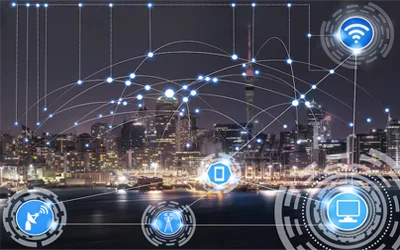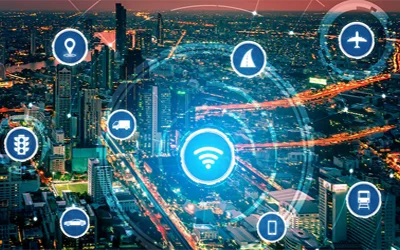Program Specific Research Domain

1. Emerging Technologies in IoT
This domain emphasizes the integration of the latest technological advancements within the Internet of Things (IoT) ecosystem. Students learn about how cutting-edge innovations—such as AI, ML, Blockchain, and Cyber-Physical Systems—are transforming smart environments, autonomous systems, and intelligent decision-making frameworks. The curriculum equips students with foundational knowledge through core subjects like Fundamentals of Internet of Things, Artificial Intelligence & Machine Learning, and Microprocessors and Microcontrollers. It is further enhanced by electives like Industrial IoT & Smart Manufacturing, Smart Cities & Infrastructure Automation, and Augmented Reality and Virtual Reality which bridge academic concepts with real-world IoT innovations.
2. Cloud and Computing Technologies
Cloud and computing technologies form the backbone of scalable IoT solutions by enabling efficient data storage, remote access, and distributed computing. This domain introduces students to the architecture and virtualization of cloud platforms, essential for managing massive IoT data streams. Core subjects such as Operating Systems, Software Engineering, and Cloud Computing and Virtualization build foundational computing skills. Advanced electives like Edge and Fog Computing and Parallel and Distributed Computing empower students to handle real-time, resource-constrained IoT applications.


3. Data Science and Predictive Analytics for IoT
This domain prepares students to derive actionable insights from IoT-generated data using modern data analytics and machine learning techniques. It includes subjects that lay the groundwork in Mathematics-III, Data Structures, and Database Management Systems, while offering electives like Data Science, Big Data Analytics, and Natural Language Processing. These subjects allow students to explore structured and unstructured data, predict system behavior, and enhance IoT decision-making models.
4. Networking for IoT Systems
Networking forms the communication core of IoT systems, connecting millions of devices and enabling seamless data exchange. This domain develops students’ understanding of protocols, wireless technologies, and network architectures through subjects such as Computer Communication Networks, IoT System Design and Architecture, and Digital Systems and Computer Architecture. Advanced electives like Wireless Sensor Networks, Software-Defined Networking, and Blockchain Technology further enrich this knowledge, addressing challenges in connectivity, latency, and data integrity in distributed systems.


5. IoT Security and Privacy
As IoT devices proliferate, the risk of cyber threats and privacy breaches escalates. This domain trains students in ensuring secure communication, device authentication, and ethical IoT deployments. Key subjects like Cryptography and Network Security, Cybersecurity and Ethical Hacking, and IoT Governance and Ethics equip students with both the theoretical and practical skills required to safeguard IoT ecosystems. The importance of responsible innovation is reinforced by courses like Workplace Mental Health and Universal Human Values-II, grounding technical education in human-centric values.